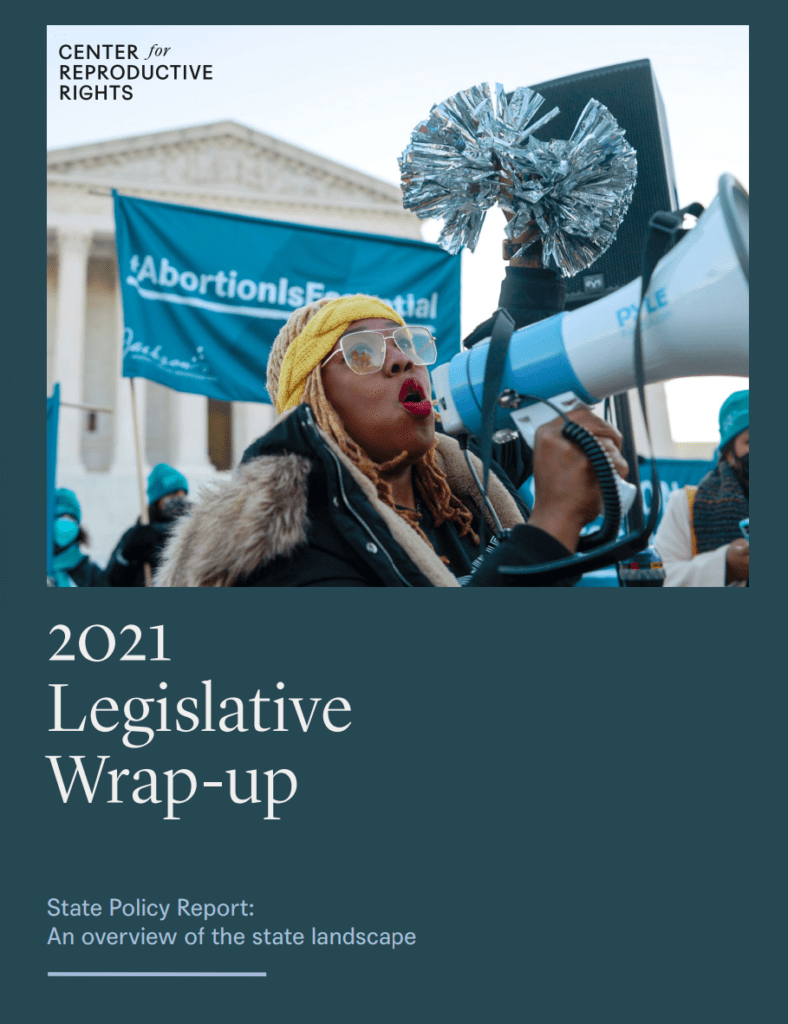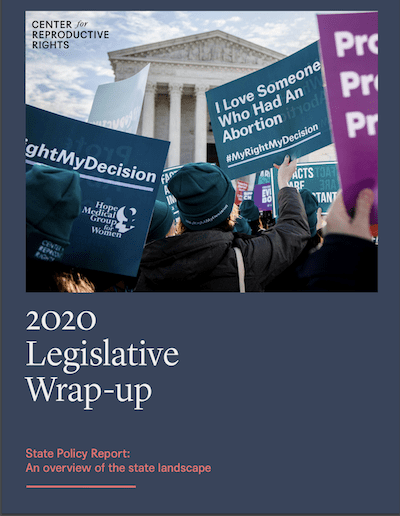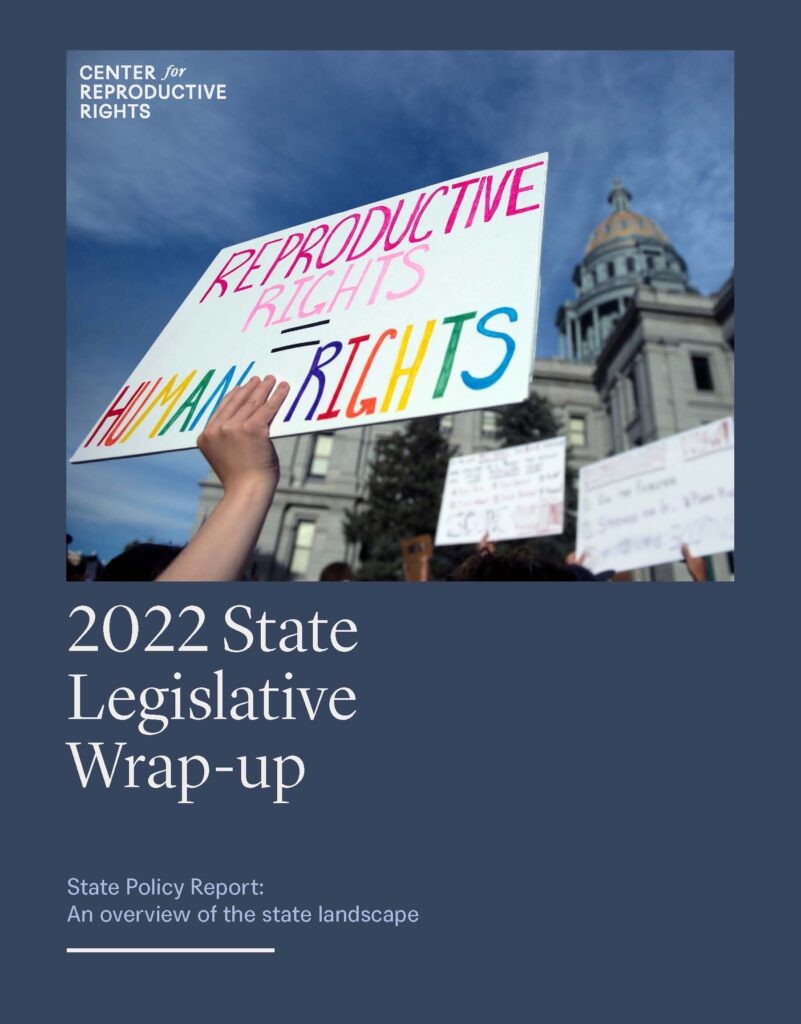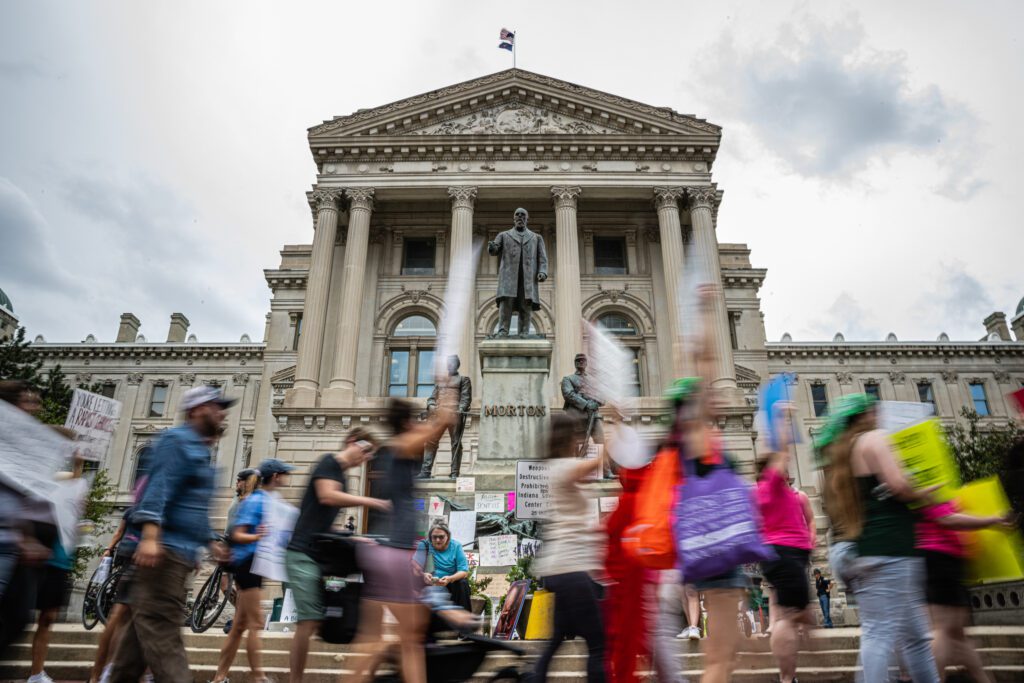Center Report: More State Abortion Restrictions Passed in 2021 Than in Any Year Since Roe v. Wade
Center releases its “2021 Legislative Wrap-up,” outlining U.S. state abortion restrictions and protections passed in 2021.
In 2021, states across the U.S. passed laws restricting and banning abortion at a rate higher than in any previous year since the U.S. Supreme Court affirmed the constitutional right to abortion in 1973.
This analysis comes from the Center for Reproductive Rights newly published 2021 Legislative Wrap-up—a yearly report on state abortion laws created by the Center’s U.S. State Advocacy Team. Read the full report here.
Read more about the Center’s state advocacy work.
The Center works in U.S. states to implement reproductive rights policy initiatives and strategies that improve access to abortion care and prevent restrictions.
As the analysis shows, 23 states spent 2021 passing an array of extreme abortion bans and restrictions including six-week bans enacted in Texas, Idaho, Oklahoma, and South Carolina— and total bans in Arkansas, Arizona, Oklahoma, and South Carolina. Eleven states passed protections for abortion rights and access including by repealing abortion restrictions and expanding insurance coverage for abortion care.
Bans on abortion disproportionately impact people who already face discriminatory obstacles when accessing health care—particularly Black, Indigenous, and people of color and those living on low incomes. Yet, state legislatures chose to push restrictive abortion measures that increase barriers to care despite the urgent need to respond to the continuing global coronavirus pandemic and ongoing health disparities experienced by Black communities and other communities of color.
Wave of Restrictions Enacted in 2021
In 2021, the Center tracked more than 400 restrictive anti-abortion measures, including medication abortion restrictions, gestational and method bans, restrictions on minors’ access, religious refusal laws, and TRAP (targeted regulation of abortion provider) laws, among others. The goal of these laws is to impede and block access to abortion care—and provide test cases for the U.S. Supreme Court to overturn Roe. Many of the unconstitutional laws enacted were or are being challenged in court and have been blocked temporarily or permanently.
Here are just some of the restrictions enacted in 2021:
Medication Abortion Restrictions
The demand for medication abortion coupled with its safety and reliability has made it a target for abortion opponents, who introduced a record number of restrictions and bans this year to block access. In fact, 15 states introduced 23 restrictive medication abortion bills, nine of which were enacted:
- Telemedicine bans were enacted in Arizona, Oklahoma, Indiana, Montana, and Texas.
- Texas introduced a bill that prohibits medication abortion after 49 days of gestation—three weeks earlier than the recommendation of up to 10 weeks of gestation.
- Oklahoma and Indiana banned the use of medication abortion after 10 weeks of pregnancy.
- Arkansas, Indiana, Louisiana, Montana, Oklahoma, West Virginia, and South Dakota enacted so-called medication abortion “reversal” bills, forcing providers to give false and misleading information to patients about the potential to “reverse” a medication abortion—a claim that has no basis in credible medical research.
Abortion Bans Prior to Viability
Changes in the composition of the U.S. Supreme Court have emboldened states to introduce and enact unconstitutional pre-viability bans in an attempt to ban abortion completely or at various stages of gestation, including as soon as six weeks. During 2021, 96 gestational bans were introduced in 30 states and many were enacted:
- Arizona enacted an omnibus bill that grants fetal personhood to a fetus of any gestational age.
- Four total bans prohibiting all abortion care were enacted in Arkansas, Arizona, Oklahoma, and South Carolina.
- Oklahoma enacted a total ban through amending physician licensure to define performing an abortion as “unprofessional” conduct.
- Six-week bans were enacted in Idaho, Oklahoma, South Carolina, and Texas.
- Montana enacted a 20-week ban.
Protections Enacted in 2021
While attacks on reproductive rights are intensifying, some states enacted measures to protect and expand access to abortion. In 2021, the Center tracked almost 100 proactive abortion bills of which 11 were enacted that mandate insurance coverage for abortion care, expand provider scope of practice, and repeal abortion restrictions, including criminal penalties.
- New Mexico repealed its unconstitutional pre-Roe ban on abortion that was made unenforceable by the Court’s decision in Roe.
- New Jersey repealed a number of abortion restrictions.
- Delaware repealed its pre-Roe bans, located in various sections of the criminal code that criminalizes prescribing medication abortion, self-managed abortion, and abortion generally.
- Virginia enacted legislation that repealed the prohibition against private insurance providers covering abortion procedures.
- Washington now requires public university health insurance plans that cover maternity care to also cover abortion care.
- Hawaii and Washington enacted bills that expand the scope of practice to include nurse practitioners and physician assistants.
- The city of Portland, Oregon enacted a resolution to fund abortion.
- Illinois passed a bill that repealed the state’s parental notification act, expanding young people’s access to abortion.
Despite these bright spots, 2021 was an unprecedented year for abortion restrictions and bans enacted to impede access to this essential health care.
Abortion Rights and Access at the U.S. Supreme Court
The relentless attacks on abortion rights and access of 2021 took place as the U.S. Supreme Court considered two major abortion cases—both brought by the Center—including a challenge to Texas’s 2021 six-week ban. In this case, Whole Woman’s Health v. Jackson, the Court repeatedly refused to block the ban and, in its ruling, effectively greenlit the state’s “vigilante” scheme of placing enforcement of the ban in the hands of private citizens. The ban has effectively ended most abortion access in the state.
In Dobbs v. Jackson Women’s Health Organization—which challenges Mississippi’s pre-viability 15-week abortion ban—the state of Mississippi has asked the Court to overturn Roe and rule that there is no fundamental right to abortion in the U.S. Constitution. It’s the most consequential abortion rights case in generations, with a decision expected in the Spring of 2022.
Read the 2021 State Legislative Wrap-up here.
Learn more:
The Center’s Interactive U.S. Abortion Laws Map: What if Roe Fell?




